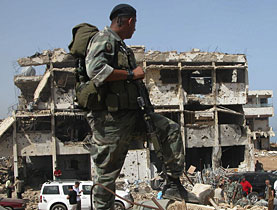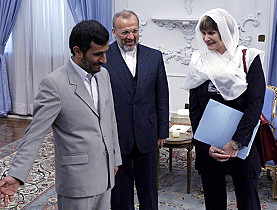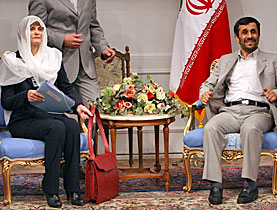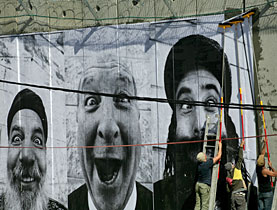Swiss pledge funds to boost Palestinian order

Switzerland will follow through on its part of a $7.7 billion (SFr8 billion) plan designed to assist Palestinian authorities in building a viable state.
Foreign Minister Micheline Calmy-Rey made the announcement on Tuesday in Berlin, during the second of two consecutive high-level conferences on reconstruction and security in the Middle East.
On Monday in the Austrian city of Vienna, she announced SFr25 million ($23.87 million) in aid for Palestinian refugees in Lebanon to be provided between 2009 and 2012, as well as SFr6.5 million primarily allocated to the beleaguered Nahr el-Bared refugee camp.
Tuesday’s talks in the German capital were the latest in a series of gatherings in support of an Israeli-Palestinian peace initiative led by President George W Bush and US Secretary of State Condoleezza Rice in Annapolis, Maryland last November.
“We are committed to building a viable Palestinian state and have reiterated to the Palestinian people our support and encouragement to achieve this ambitious goal,” Calmy-Rey said in her address to delegates.
“Much remains to be done. However, all parties agree that the realization of the Palestinian Reform and Development Plan cannot be done without improving the situation on the ground.”
Infrastructure and institutions
The plan, endorsed in Paris by the European Union, the US, the International Monetary Fund and the World Bank in December 2007, aims to build the infrastructure and public institutions necessary to support an independent Palestinian state.
The meeting’s main players set about figuring out how to pay for the type of projects meant to restore order to the Palestinian Territories. Germany hopes to raise some $180 million for projects including courthouses and prisons.
“The Berlin conference is expected to ensure the financing of a consolidated and feasible short-term measure package to continuously improve the security in the West Bank, including improving the training for 6,000 to 7,000 Palestinian civilian police, renovating police stations and better equipping Palestinian police,” the German government said in a statement.
The Palestinians took advantage of the international forum to highlight the need for funds.
“Our public finance situation is entering a very critical stage in terms of availability of resources,” Palestinian Prime Minister Salam Fayyad warned delegates. “Ladies and gentlemen, we’re running out of resources. We are in a crisis situation.”
So far, around $600 million of the $7.7 billion pledged in Paris has been handed over to the Palestinians.
Switzerland will contribute $27 million annually, $5 million of which is specifically earmarked towards promoting good governance initiatives. The Swiss government will continue to support independent human rights organisations and security sector reform programmes for the Palestinians, Calmy-Rey said.
“Security and the rule of law are undoubtedly key areas in the construction of a state,” she told delegates.
Sideline talks
Political talks on the peace process took place on the sidelines in Berlin as Egyptian President Hosni Mubarek pledged to negotiate for the release of kidnapped Israeli soldier Gilad Shalit. The so-called quartet of Middle East policy leaders – the EU, US, UN and Russia – also met.
It was the first opportunity for the group to weigh up the truce struck on Thursday between Israel and Hamas Islamists in Gaza.
The ceasefire was shaken on Tuesday when militants in the Hamas-controlled Gaza Strip fired at least two rockets into southern Israel after Israeli troops killed two Palestinians in the West Bank city of Nablus.
The Palestinian Prime Minister condemned the raid from Berlin, saying: “It is essential for the ceasefire, for calm to be sustained.”
Participants at the Berlin conference had welcomed the truce in their opening speeches. Although Hamas and its 1.5 million subjects in the Gaza Strip stayed off the official agenda, delegates debated whether the group ought to be included in talks in light of the ceasefire.
Switzerland is the only Western state that has until now chosen to engage the Islamist organisation.
“I think that the Swiss policies towards Hamas are policies much more orientated towards dialogue and construction and not towards the majority European posture which is much more dogmatic and closer to the American approach of considering Hamas as a terrorist movement,” Daniel Meier, a political scientist at the Graduate Institute of International and Development Studies in Geneva, told swissinfo.
“That gives Switzerland the capacity to become a spokesman or mediator for certain European voices that no longer demonstrate openly their own diplomacy for one country or another, and use the Swiss channel for that,” he added. He called the approach of isolating Hamas “problematic”.
Calmy-Rey’s statement on Tuesday made no mention of Hamas, but she said the government would be open to boost its contribution to Palestinian justice reform.
swissinfo, Justin Häne
SFr2 million for the Nahr el-Bared refugee camp
SFr4.5 million for humanitarian and development
SFr25 million general funding (2009-2012)
$27 million ($5 million earmarked for good governance projects) annually
$7.7 billion pledged by 87 countries over 3 years
70 per cent designated to cover the Palestinian Authority’s budget shortfall and later, for development projects
The Nahr el-Bared camp is situated 16 kilometres north of the Lebanese city of Tripoli.
The camp’s population is around 30,000, according to the UN. There are 400,000 refugees living in Lebanon.
The UN describes Nahr el-Bared as overcrowded and very poor.
Ten UNRWA schools enrolled 5,686 students in 2003-04.
The camp was established in 1949 and UNRWA began providing services for refugees there in 1950.
The UNRWA is the largest agency within the UN, employing some 25,000 staff.

In compliance with the JTI standards
More: SWI swissinfo.ch certified by the Journalism Trust Initiative



You can find an overview of ongoing debates with our journalists here . Please join us!
If you want to start a conversation about a topic raised in this article or want to report factual errors, email us at english@swissinfo.ch.